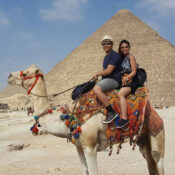
The Fascinating Role of Religion in Egyptian Culture
Religion has been a cornerstone of Egyptian culture for thousands of years, shaping its traditions, architecture, and daily life. From the worship of ancient gods to the influence of Christianity and Islam, religion continues to play a significant role in Egypt’s societal framework. In this blog, we’ll explore the historical and contemporary impact of religion in Egyptian culture and how Alibaba Excursions Hurghada can offer you a unique insight into this deeply spiritual land.
The Roots of Ancient Egyptian Religion
Egypt’s religious heritage dates back to prehistoric times when early inhabitants revered nature and the forces they could not control. Over millennia, these beliefs evolved into a complex system of deities, rituals, and temples that defined the ancient Egyptian worldview.
The Pantheon of Egyptian Gods
The ancient Egyptians worshiped a vast array of gods and goddesses, each representing different aspects of life, nature, and the cosmos. Some of the most significant deities include:
1. Ra: The Sun God
Ra was considered the king of all gods and the personification of the sun. Ancient Egyptians believed that Ra sailed across the sky in his solar boat every day, bringing light to the world, and journeyed through the underworld at night.
2. Osiris: God of the Underworld
Osiris was the god of the afterlife, symbolizing resurrection and eternal life. He played a crucial role in the mythology surrounding death and the afterlife, making him one of the most important deities in ancient Egypt.
3. Isis: The Mother Goddess
Isis was revered as the goddess of fertility, motherhood, and magic. Her devotion to her husband, Osiris, and her son, Horus, made her a symbol of loyalty and love, worshipped by families across Egypt.
The Role of Temples in Ancient Religion
Temples were the center of religious life in ancient Egypt, serving as homes for the gods. Pharaohs built grand temples to honor deities, seek their favor, and showcase their own power.
The Experience with Alibaba Excursions Hurghada
Alibaba Excursions Hurghada offers guided tours to some of the most iconic temples, such as Karnak and Luxor, where you can witness the grandeur of ancient Egyptian religion firsthand. The expert guides provide fascinating insights into the rituals and ceremonies that took place in these sacred spaces.
The Concept of the Afterlife in Ancient Egypt
The afterlife was a fundamental aspect of ancient Egyptian religion. Egyptians believed in a journey to the afterlife, where the soul would be judged and, if deemed worthy, granted eternal life.
The Importance of Mummification
To ensure the soul’s safe passage to the afterlife, Egyptians developed the process of mummification. This elaborate ritual involved preserving the body so that the soul could recognize it in the afterlife.
Key Elements of Mummification
- Removal of Organs: The internal organs were removed and stored in canopic jars.
- Wrapping the Body: The body was wrapped in linen, often with protective amulets placed between the layers.
- Hurghada Excursions with Alibaba: When you visit the Egyptian Museum with Alibaba Excursions Hurghada, you can see some of the finest examples of mummies, including those of famous pharaohs like Ramses II.
The Book of the Dead
The “Book of the Dead” was a collection of spells and incantations meant to guide the deceased through the afterlife’s dangers. These texts were inscribed on papyrus scrolls and placed in tombs.
The Influence of Religion on Egyptian Art and Architecture
Religion profoundly influenced Egyptian art and architecture, with temples, pyramids, and statues reflecting the Egyptians’ spiritual beliefs.
Pyramids: Tombs of the Pharaohs
The pyramids are perhaps the most iconic representation of ancient Egyptian religion. Built as tombs for the pharaohs, they were designed to help the ruler’s soul ascend to the afterlife.
Visiting the Pyramids with Alibaba Excursions Hurghada
A trip to the Giza Plateau is a must for any traveler. With Alibaba Excursions Hurghada, you can explore these ancient wonders with a knowledgeable guide who will share stories of the pharaohs and the religious significance of these monumental structures.
Hieroglyphics: The Sacred Writing
Hieroglyphics, the writing system of ancient Egypt, were often used to inscribe religious texts and temple walls. These intricate symbols were believed to have magical properties and were essential for rituals.
Exploring Ancient Inscriptions
During tours with Alibaba Excursions Hurghada, you can see hieroglyphics up close at various temples and learn about their meanings and the stories they tell.
The Transition to Christianity
The advent of Christianity brought significant changes to Egypt’s religious landscape. By the 4th century AD, Egypt had become predominantly Christian, with the Coptic Church playing a vital role in the community.
The Rise of the Coptic Church
The Coptic Orthodox Church of Alexandria is one of the oldest Christian denominations in the world. It traces its roots back to Saint Mark, who is believed to have brought Christianity to Egypt in the 1st century AD.
Coptic Monasteries and Churches
- The Hanging Church: One of the oldest churches in Cairo, it is a prime example of Coptic architecture.
- Alibaba Excursions Hurghada Experience: Explore these ancient Christian sites with Alibaba Excursions Hurghada and learn about the unique practices and traditions of the Coptic faith.
The Spread of Islam in Egypt
Islam arrived in Egypt in the 7th century AD with the Arab conquest. Over time, it became the dominant religion, influencing every aspect of Egyptian life, from politics to daily customs.
Islamic Architecture and Influence
Islamic Cairo is renowned for its stunning mosques, madrasas, and minarets. These structures reflect the rich Islamic heritage of Egypt and are a must-see for anyone interested in the country’s religious history.
Key Islamic Monuments
- Al-Azhar Mosque: A center of learning and one of the oldest universities in the world.
- Mosque of Muhammad Ali: Located in the Citadel of Cairo, it offers stunning views of the city.
- Alibaba Excursions Hurghada Tip: Join a guided tour of Islamic Cairo to delve into the rich history and architectural splendor of these religious sites.
Modern Religious Practices in Egypt
Today, Egypt is predominantly Muslim, with Islam deeply intertwined with the country’s cultural and social norms. However, a significant Christian minority (mostly Coptic Orthodox) also plays an essential role in the fabric of Egyptian society.
Daily Life and Religion
Religion influences many aspects of daily life in Egypt, from prayer times to social customs. The call to prayer (adhan) echoes through cities and villages five times a day, a reminder of the country’s strong Islamic heritage.
Experiencing Local Culture with Alibaba Excursions Hurghada
With Alibaba Excursions Hurghada, visitors have the opportunity to experience the daily religious practices of locals, whether it’s visiting a mosque during prayer time or exploring a Coptic church service.
Religious Festivals and Holidays
Egypt celebrates various religious holidays, including Ramadan and Eid for Muslims, and Christmas and Easter for Christians. These festivals are marked by special prayers, feasts, and family gatherings.
Participating in Festivities
During special times like Ramadan, Alibaba Excursions Hurghada offers unique cultural tours where you can experience the local customs and traditions, such as breaking fast (iftar) with a local family.
The Role of Religion in Egyptian Tourism
Religion is not just a part of Egyptian culture; it is a significant draw for tourists. Ancient temples, mosques, and churches attract millions of visitors every year.
Religious Tourism with Alibaba Excursions Hurghada
Alibaba Excursions Hurghada offers tailored religious tours, allowing visitors to explore the spiritual landmarks of Egypt, from ancient temples to modern mosques. Their well-planned itineraries provide deep insights into the religious history and contemporary practices of Egypt.
Benefits of Religious Tourism
- Cultural Understanding: Gain a deeper understanding of Egypt’s rich religious history.
- Unique Experiences: Participate in local religious ceremonies and learn from knowledgeable guides.
The Future of Religion in Egyptian Culture
As Egypt continues to modernize, the role of religion in daily life is also evolving. While traditional practices remain strong, especially in rural areas, urban centers are experiencing shifts in religious expression.
Challenges and Adaptations
The country faces challenges in balancing its deep religious traditions with the forces of globalization. However, religion remains a source of identity and continuity for many Egyptians.
Alibaba Excursions Hurghada’s Contribution
By promoting respectful and educational religious tourism, Alibaba Excursions Hurghada helps preserve and share Egypt’s rich spiritual heritage with the world, ensuring that visitors leave with a deeper appreciation of the country’s cultural fabric.
Conclusion
Religion has shaped Egyptian culture for millennia, influencing everything from art and architecture to social customs and daily practices. From the grand temples of the pharaohs to the serene mosques of Cairo, the spiritual landscape of Egypt offers a fascinating journey through time.
Final Thoughts
- Whether you’re exploring ancient ruins or experiencing modern religious practices, Egypt’s spiritual heritage is both captivating and enriching.
- Alibaba Excursions Hurghada provides comprehensive tours that allow you to delve into this unique cultural aspect of Egypt, making your




